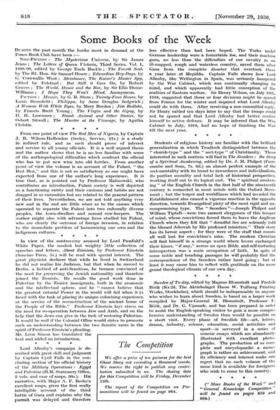From one point of view The Red Men of Nigeria,
by Captain J. R. Wilson-Haffenden (Seeley, Service, 21s.) is a study in indirect rule, and as such should prove of interest and service to all young officials. It is a well argued thesis and the author shows that he is no less familiar with some of the anthropological difficulties which confront the official who has to put new wine into old bottles. From another point of view the volume is an account of the Fulani, "the Red Men," and this is not so satisfactory as one might have expected from one of the author's long experience. It is true that, as is pointed out by Professor Malinowski, who contributes an introduction, Fulani society is well depicted as a functioning entity and their customs and habits are not dragged in as curiosities but are related to the general pattern of their lives. Nevertheless, we are not told anything very new and in the end are little wiser as to the causes which operated to separate the Fulani into two culturally diverse peoples, the town-dwellers and nomad cow-keepers. The author might also with advantage have studied his Fulani, who are clearly the outcome of foreign invasion, in relation to the immediate problem of harmonizing our own and the indigenous cultures. * * * *










































 Previous page
Previous page